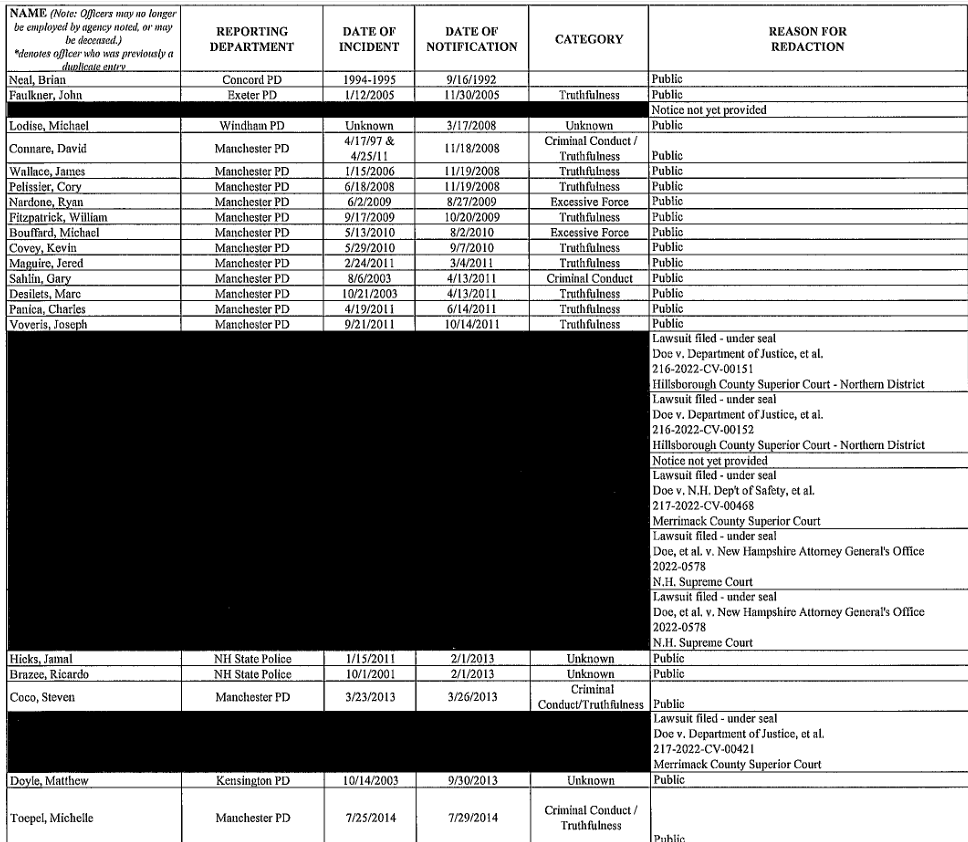See April 3, 2024 updated list here: https://indepthnh.org/wp-content/uploads/2024/04/exculpatory-evidence-schedule-list-for-april-3-2024-1.pdf
See April 3, 2024 report by Attorney General John Formella here: https://indepthnh.org/wp-content/uploads/2024/04/april-3-2024-rsa-105-13-d-exculpatory-evidence-schedule-compliance-report.pdf
See InDepthNH.org’s Laurie List archives: https://indepthnh.org/category/dishonest-police/
By DAMIEN FISHER, InDepthNH.org
CONCORD – The identities of several more police officers with credibility problems are now public in the latest update to the Exculpatory Evidence Schedule, but details about the alleged misconduct are still lacking.
The EES, also known as the Laurie List, is managed by the New Hampshire Attorney General’s Office and publicly updated once every quarter under the law passed in September of 2021. While the April quarterly update includes names of the officers added to the list, as well as the date their alleged misconduct happened, it is still not known exactly why the officers made the EES.
The list gives a short one- or two-word reason for the officer’s placement without context, such as “truthfulness,” or “criminal conduct.” For example, former Merrimack police department’s Ryan Milligan is a new name on the list who was placed on the EES for “truthfulness.” The inciting incident took place in September of 2022, and Milligan was formally placed on the list in 2023, according to the EES update.
Last year, Milligan pleaded guilty to two misdemeanor charges of tampering with public records and one count of violating the Driver Privacy Act. Milligan reportedly fabricated written traffic warnings while on a New Hampshire Office of Highway Safety traffic enforcement detail.
Milligan’s “truthfulness” lapse is only known because the New Hampshire Attorney General’s Office issued a statement when the now former officer pleaded guilty to the two misdemeanors relating to fabrication of traffic warnings and misuse of driver records.
The case of new addition Newport Police Office Shawn Seymour’s addition is murkier. Seymour was placed on the list for “criminal conduct” with a March 1, 2023, inciting incident. Neither Newport Police Chief Alex Lee, nor Sullivan County Sheriff John Simonds responded to requests for comment, and no public statement about the apparent criminal actions of Officer Seymour could be found.
New Hampshire law protects the identities of officers accused of misconduct to the extent the public only knows when a complaint against an individual officer is determined to be sustained. In those cases, little about the complaints are made public. Average citizens charged with crimes see the public disclosure of personal details, booking photos, and police written narratives of the full allegations before there has even been a trial, let alone a conviction.
The value of the Laurie List is also questionable given the high profile cases of misconduct in which the officers are never placed on the EES.
Former Claremont Police Officer Jon Stone was able to escape a Laurie List placement despite allegedly threatening to go on a shooting spree as well as threats to murder his police chief and rape the chief’s wife and young children. Stone, now a state Representative, was allegedly involved in an inappropriate relationship with a teen girl at the time he made the violent statements. But, Stone was able to negotiate a union-backed settlement to leave his job in exchange for keeping his internal affairs files secret.
Lebanon’s former Police Lt. Richard Smolenski is another notable name not on the EES. Smolenski was charged in 2021 with cyber-stalking and harassing his ex-girlfriend by threatening to release revenge porn, though the case was later dismissed when his attorney argued the statements were protected under the First Amendment.
Smolenski’s record as a police officer includes being disciplined for conducting another affair with an 18-year-old woman while on duty, and commanding intoxicated officers to respond to a SWAT situation involving an armed suspect.
Haden Wilber, the former New Hampshire State Trooper whose lies at a traffic stop cost the state more than $200,000 in a lawsuit, is also not on the list. Wilber lied that a woman he pulled over during a February of 2017 traffic stop had secreted drugs into her body. The woman ended up jailed for two weeks and was subjected to repeated internal exams before she was finally released. No drugs were found inside the woman.
Meanwhile, the public list includes officers like Alexandra Drake, the former New Boston police officer who landed on the list after she reported sexual harassment by a superior. Drake would go on to get $160,000 in a lawsuit settlement with the town.
There are currently 214 names made public on the EES, and another 59 officers are still confidentially fighting their placement in Superior Court out of 75 officers who notified the attorney general that they filed lawsuits to get their names off the list. A law passed in September of 2021 gave all of the officers on the list the opportunity to confidentially file a lawsuit to try to have their names removed.
They are generally confidential and filed under John or Jane Doe in Superior Court. There’s an additional 23 officers on a temporary, non-public EES. These officers are fighting their placements through their union’s grievance system.
The Laurie list has been controversial since the public first learned more than a decade ago that prosecutors keep secret lists of officers with sustained discipline in their confidential personnel files that could negatively reflect on their credibility to testify in court.
The U.S. Supreme Court in the Brady v. Maryland case over half a century ago made it clear that criminal defendants must receive all exculpatory evidence, or the conviction could be at risk of being overturned or the case tossed out altogether.
The constitutional guarantee of all favorable evidence for criminal defendants was brought home in New Hampshire in 1995 when Carl Laurie’s murder conviction was overturned because then-state prosecutors John Davis, who went on to become a federal prosecutor, and Diane Nicolosi, now a Superior Court judge, withheld evidence that the main police investigator in the murder investigation was known to have been disciplined for dishonesty and other serious issues.





